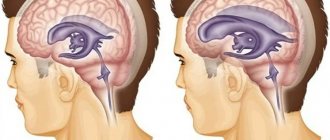Consequences of stress, How to cope with stress, Stress and (anti)aging, Psychosomatics Irina Vasilyeva What diseases do you think people die from most often? Perhaps in the current situation, you will say that it is from viruses. Not at all. According to WHO statistics, the most common cause of death is diseases of the cardiovascular system. And among cardiovascular diseases, hypertension is one of the most common. It is surprising, however, that the same hypertension from which millions of inhabitants of planet Earth suffer is basically of a psychosomatic nature. And this means, dear friends, that in addition to drug treatment, for this disease it is very important to work with the internal psychological state. How does the psychosomatics of hypertension arise and how to protect yourself from it? In today's article I will talk about exactly this.
Good afternoon, dear reader! I think it’s important to start today with a story from one of my clients. This is a man, a good family man and a responsible manager.
“I'm only 42 years old. I have been suffering from hypertension for the past few years. The diagnosis was made to me almost immediately, as soon as I went to the doctor with constant headaches.
I cannot say that the treatment during this time helped. Headaches and high blood pressure became my constant companions.
The doctor, seeing that drug treatment only slightly alleviated the symptoms, advised me to seek help from a psychologist or psychotherapist.”
And this story is not unique.
Back in the mid-twentieth century, the American psychoanalyst Franz Alexander said that hypertension is a psychosomatic disease.
And this is not without reason.
Strong anger and other negative emotions that occur frequently contribute to hormonal imbalance.
This in turn causes increased heart rate and breathing, as well as increased blood pressure. In addition, negative emotions suppress the immune system and reduce cognitive abilities.
Of course, the heart and blood vessels, often working in “intensified mode,” wear out faster. Anger, aggression, anger - these are the emotions that provoke the onset of hypertension.
Who is most often diagnosed with hypertension?
Numerous studies have shown that hypertension is characteristic of people with certain personality characteristics. I'll tell you about the most common ones.
People who want to be in control
As you understand, life events are not always a clear chain of cause-and-effect relationships. It happens that unexpected things happen, pleasant and unpleasant surprises. It happens that there is much more chaos than order.
For people who want to keep everything under control, the slightest “deviation from a pre-planned plan” simply drives them crazy. They begin to feel extremely anxious and defenseless in the face of such an unpredictable world.
But even if chaos is rare, the desire to control all areas of life is extremely exhausting. A person is constantly tense and cannot relax.
Even while falling asleep, he replays past or future events in his head.
And, of course, stress forces the heart to work harder, which cannot but affect the health of the cardiovascular system.
People with high levels of anxiety
When a person experiences anxiety, his body begins to prepare for the worst. First of all, processes occur that are designed to protect against danger.
Please note that the body does not care whether the danger is imaginary or real. In both cases, the mobilization of all reserves is in full swing.
Initially, the level of cortisol, adrenaline and norepinephrine in the blood increases sharply. The need for oxygen and nutrients increases.
The heart begins to beat faster, the lungs breathe quickly and shallowly, the muscles become ready at any moment to repel an attack or take flight.
This condition greatly depletes the body's reserves. If it happens rarely, it does not cause much harm.
However, with frequent situations that cause anxiety or with a constant high level of anxiety, the body does not have time to recover.
A lack of vitamins and minerals accumulates, and tachycardia and arrhythmia may develop.
And hypertension becomes a constant companion.
People suffering from irrational fears
Unreasonable fear can also cause psychosomatic hypertension to occur. Note, not any fear, but only irrational one.
The reason for this is simple. In the presence of real danger, our body reacts to the environment. By reacting in a certain way, a person moves from a feeling of danger to a feeling of security.
With irrational fears, a feeling of safety almost never occurs.
For example, if a person is afraid of the dark, then the feeling of fear haunts him every evening and every night. And if a person is afraid of death, then the feeling of fear haunts him all his life (after all, it is really unknown what can happen and when).
Accordingly, due to constant fear, the nervous system is overloaded, and this cannot but affect the functioning of the heart and blood vessels.
They work to the limit of their capabilities, which often serves as a prerequisite for the development of hypertension.
In addition, there are some character traits that contribute to frequent increases in blood pressure.
This:
- High ambition;
- Tendency to dependency;
- Desire for competition;
- Unstable self-esteem, lack of self-confidence;
- Inability to take criticism;
- Inability to forgive;
- The tendency to focus too much on the mistakes of others;
- Excessive dominance, authoritarianism, suppression of others;
- Excessive expression of one’s emotions, inability to cope with anger, outbursts of aggression;
- Possessive tendencies in communicating with other people, jealousy.
As you know, residents of megalopolises and large cities more often suffer from hypertension than residents of small settlements.
The reason for this is simple and obvious. In big cities there is a cult of the successful person.
This leads to the formation of a certain lifestyle, which also becomes a prerequisite for the development of hypertension.
Most modern residents of a big city most often experience:
- High achievement motivation;
- Desire for rapid career growth;
- Workaholism;
- Bad habits;
- Passive lifestyle;
- Constant pressure;
- Secrecy, restraint, stubbornness;
- Egocentrism;
- Intrapersonal conflict associated with feelings of guilt.
This is what a modern person pays for maintaining the image of a successful person.
Physiological prerequisites for the development of hypertension
To be fair, I will say that there are other prerequisites for the development of hypertension.
Our soul and our body are inextricably linked. They mutually influence each other.
Therefore, I will list other reasons that are not directly related to personal characteristics.
This:
Floor
Adult men are much more likely than women to suffer from symptoms of hypertension.
Age
The risk of developing hypertension increases after 50 years of age. In both women and men, this is associated with suppressed sexual function.
Excess weight
Extra pounds can be associated with inactivity, overeating, and endocrinological disorders. If you know the reason for your obesity, work to eliminate it.
Because excess weight is always an additional burden on the heart, blood vessels, bones and muscles.
Smoking
Smoking negatively affects all organs and systems of the body. The lungs, heart, gastrointestinal tract and much more are affected.
Diabetes
Because of this chronic disease, blood vessels become less elastic, brittle, and are easily injured. Even frequent minor hemorrhages are possible.
Of course, this does not contribute to good functioning of the cardiovascular system.
Psychosomatics of hypertension
Hypertension (hypertension) is usually classified as a psychosomatic disease when mental factors (various traumatic situations, negative psychological states, frustrations, etc.) lead to their occurrence. After all, this often happens: you worry too much - and your blood pressure increases. Then the situation improves and the pressure returns to normal. But what if a person lives in a state of chronic stress or constant psychologically traumatic situations, if the body’s “defense forces” fail? This situation can become “fertile” soil for the emergence of hypertension.
In hypertension, there is increased pressure in the blood vessels with increased tone of their walls (first, the tone of the vascular walls increases, as a result of which the vessels narrow and the pressure increases). In this process, a person’s negative emotions and activation of the autonomic nervous system can play a rather important role. The autonomic nervous system is closely connected with both our emotions and vascular tone, which means that, regardless of our conscious control, emotions can influence the functioning of the body.
How does the influence of mental factors and negative emotions manifest themselves in the case of hypertension? Everything can start with the so-called. “resistance”: the body begins to “resist” external negative influences (physical or psychological), the heartbeat quickens and blood flow increases, muscles tense - this is how the body tries to satisfy the body’s needs for oxygen, to prepare a person to fight the source of “pressure”. Over time, the source of the negative impact (pressure) disappears, and the body relaxes, the heartbeat slows down and the pressure normalizes. At least that's how it should happen. In fact, constant psychotraumatic factors, which are accompanied by a bouquet of negative emotions, can disrupt the normal functioning of blood vessels: they do not have time to return to normal immediately after stressful situations and therefore blood pressure remains elevated. This is how it turns out that regular bursts of negative experiences can affect the appearance and development of hypertension.
What are the first “bells” that psychosomatic hypertension will arise in the future?
Future hypertension does not immediately manifest itself as increased blood pressure.
Its appearance is preceded by many “bells” that not everyone pays attention to.
I'll tell you a little more about them.
Fatigue, chronic fatigue
Everything that recently brought joy, brought healthy excitement, and made the blood flow, is now perceived as an additional burden for the exhausted psyche.
A person begins to have difficulty fulfilling his work responsibilities, refuses active forms of leisure, and prefers to “eat up” stress with food or “wash it down” with alcoholic beverages.
Sleep quality disorders
It all starts with slight difficulties falling asleep and, if a person does nothing, ends with insomnia. Sometimes sleep disturbances, even before the development of hypertension, manifest themselves in the form of restless, disturbed sleep, unpleasant dreams, and nightmares.
Often, not yet knowing about problems with blood pressure, a person sees a chase in a dream, feels short of breath, and pressure from the outside.
One of my clients often had dreams where he was covered with grain. Either he is at the depths of the barn, then in the back of a truck, or in a freshly dug hole. He looks up and grain falls on him. It covers his body so much that he can no longer breathe.
Most often, during the stage of lack of breathing, he woke up in a sweat with a strong heartbeat. This dream actually signaled to the dreamer about health problems long before serious symptoms appeared.
I advised this man to undergo a medical examination. And thanks to the fact that we combined drug treatment prescribed by a cardiologist and psychotherapeutic work, the result was simply magnificent.
I would like to note that working with dreams is, in some way, my know-how in psychotherapy. Being a body therapist and working with multiple manifestations of stress in a person, I noticed that the most delicate, one might say, jewelry work is carried out precisely through dreams.
My method is not a continuation of Jungian dream analysis. Rather, it has eastern roots and aims to “reconcile the irreconcilable,” and in fact accept the fact that “body and soul are inseparable,” that “by influencing the body, we heal the soul,” “by influencing the soul, we heal the body.” Dreaming in this context is the subtlest tool for healing the soul.
You can learn more about my method of dream analysis by completing my online training or reading my book. I am sure this will open up new dimensions of self-knowledge for you. I think you will find an incredible amount of discoveries and revelations about yourself.
Decreased performance, deterioration of cognitive abilities
Another sign of poor functioning of the heart and blood vessels.
Even before the appearance of headache that accompanies hypertension, its predecessors are
- deterioration of attention, memory,
- rigidity of thinking,
- inability to be creative.
During the working day, a person feels apathy, lethargy, and sometimes drowsiness.
At the same time, he may be visited by a feeling of indifference to the world around him and a feeling of general hopelessness.
Paranoid signs
A completely normal, adequate person can suddenly become suspicious, overly hot-tempered, overly touchy.
He may perceive the calm, even attitude of others as unkind towards his personality.
Suggestibility
A person can become too suggestible.
He begins to invent problems from scratch, and then experiences them for a long time and painfully in his own head.
How to diagnose?
First you need to understand how dangerous your condition is. Diagnosis of hypertension begins with measuring blood pressure.
Mild degree
In mild cases, the pressure does not rise above 159/99. In this case, timely contact with a cardiologist and psychotherapist gives a chance for a complete recovery.
Of course, this will require changing your lifestyle, your way of interacting with others, and establishing a comfortable regime of work and rest.
But, you see, for the sake of your own health, you can go beyond such feats.
Average degree
The situation is worse with pressure readings above 160/109.
With such high blood pressure, hypertension can occur with the threat of damage to internal organs.
Therefore, if you find such indicators in yourself, psychotherapy and lifestyle changes alone will not improve the situation.
This condition is aggravated by other symptoms:
- tachycardia,
- heartache
- headache,
- swelling,
- nausea,
- heaviness in the legs,
- dizziness,
- diarrhea.
Severe degree
This degree occurs after pressure readings of 180/110 and above.
In this case, it is necessary to urgently consult a doctor. It is best to call an ambulance.
This condition can cause myocardial infarction, arrhythmia, heart failure, angina pectoris, and hypertensive crisis.
Psychology of illnesses
Quite often, diseases come into our lives as a result of certain thinking, behavior or psychological influences from the outside. This section describes the probable causes of a particular disease.
Many psychologists believe that diseases do not come to us by chance, and that the cause of this or that illness can be our mental perception of this world. In order to identify the cause of the disease, you will have to delve into your spiritual state and understand what exactly could affect your physical condition.
This service was created on the basis of many years of research by the American psychologist Louise Hay, the Canadian philosopher and psychologist Liz Burbo, the wonderful doctor Valery Sinelnikov, as well as the interpretation of the Russian psychologist Vladimir Zhikarentsev










